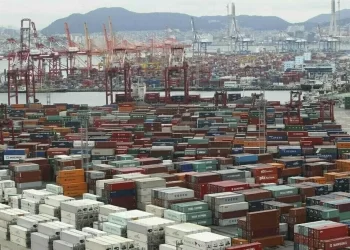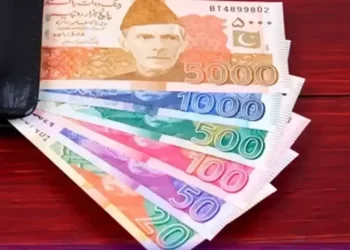In a startling revelation, it was learnt that the top 5% earners in Pakistan have not paid taxes to the tune of Rs1.6 trillion.
The figures were shared by Federal Board of Revenue (FBR) Chairman Rashid Mahmood Langrial while addressing a press conference on Thursday alongside Federal Minister for Finance and Revenue Senator Muhammad Aurangzeb and Minister of State for Finance and Revenue Ali Pervaiz Malik.
Addressing the attendees, the FBR chief said the government’s tax gap for the current fiscal year would be Rs7.1 trillion, which was around Rs6.2 trillion last year.
He said the government’s major interventions are focused on top 5% of earners.
Langrial shared that around 3.3 million individuals fall under the top 5% of the earning category. Out of these, only 0.6 million file returns while the remaining 2.7 million do not file income tax returns.
“They are either filing below this category or are not filing at all. Their tax liability stands over Rs1.6 trillion,” revealed Langrial.
The FBR chairman stated that even if the government adds all categories below the top 5% of earners, the total unpaid tax liability is not over Rs140 billion.
Meanwhile, Aurangzeb said reforms in taxation are a vital part of the government’s structural reform agenda.
He said that the Tax amendment bill introduced recently in the parliament aims to bring effective compliance in the tax regime.
Talking about the digitization efforts of the government, the finance minister informed that in September, Prime Minister Shehbaz Sharif approved the design phase for digitization “and after that, in the last three to four months, we have now entered the execution phase”.
He said that the government is focused on modernising the internal systems of FBR.
“We are not only focused on increasing revenue, we also intend to improve the economy, ease of doing business to make this a win-win for the country,” he said.
Aurangzeb said the government intends to increase the tax-to-GDP ratio to at least 13%. “Because that’s where our fiscal situation would become at least sustainable.”
Responding to a query, Aurangzeb acknowledged that “compared to the tax revenue target, we are behind”.
“We are making every possible effort to get to the target. When the International Monetary Fund (IMF) mission visits, we will have a discussion with them in good faith,” he said.
He shared the inflation rate has become a key agenda item of the Economic Coordination Committee (ECC), and will be monitored regularly.
Minister of State for Finance and Revenue Ali Pervaiz Malik said the government intends to enhance its tax revenue sources to a reasonable extent.
The state minister shared that till October 2024, around 5 million individuals filed their tax returns, which was around 3 million last year.
The minister said the government after analysing consumption data identified around 190,000 individuals “who should have been included in the taxation net were non-filers”.
“Safely assuming these individuals were liable to pay Rs50-60 billion in direct taxes,” he said.
Addressing a query, Langrial said the GST rate may be reduced to 10-12% in the coming years.
Meanwhile, in a separate query, Information Minister Attaullah Tarar brushed off concerns regarding voices raised by international agencies against the recent conviction of 25 civilians by a military court for their alleged involvement in the May 9 riots last year.
“We remain fully compliant with all requirements of international forums. There are no compliance issues,” he maintained.
Earlier, the European Union (EU) strongly reacted to the recent conviction saying that “these verdicts are seen as inconsistent with the obligations that Pakistan has undertaken under the International Covenant on Civil and Political Rights (ICCPR).”









